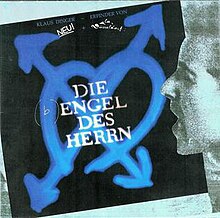Die Engel des Herrn (album)
| Die Engel des Herrn | ||||
|---|---|---|---|---|
 | ||||
| Studio album by Die Engel des Herrn | ||||
| Released | 1992 | |||
| Recorded | 1988–9 | |||
| Label | L.S.D., Captain Trip Records | |||
| Producer | Klaus Dinger | |||
| Klaus Dinger chronology | ||||
| ||||
Die Engel des Herrn (styled as "DIE (b)ENGEL DES HERRN") is a 1992 studio album by the band Die Engel des Herrn. It was originally released in a limited edition of 1000 on the private label L.S.D., which Klaus Dinger created when he failed to find a record label willing to release the album. When Dinger signed to Captain Trip Records in 1995 all copies of the album not yet sold were bought up and sold by CTR, although no more copies of the album were ever pressed. Consequently only 1000 copies of the album exist, and it is one of the rarest Klaus Dinger albums.
Background and recording
[edit]Following the recording of Néondian in 1984, Dinger was enormously in debt. He attempted to reform Neu! with Michael Rother in 1985, but the reunion faltered and the new album (eventually released as Neu! 4) was shelved in early 1986. Dinger then began recording demos for a second solo album along the lines of Néondian, but was dropped from Virgin Records before the album could be professionally finished (it was eventually released as Blue in 1999). Dinger, severely disillusioned with the music industry, opted to form a new band using younger musicians.
"...during the rescue of Néondian at Conny's studio, [the studio musicians] were onto 500 Marks a day. It was no good experience. It was the way they make music. Some people call them the whores of rock. For me, it's nearly impossible to work with these people on this 500 Marks per day level. ...my solution was to go back to where it all starts and that is normally schooldays [sic]. Young people who are not corrupted by business and money and all these difficult things. I was prepared to go a long way with these young people."[1]
The as yet unnamed band performed at a concert in Düsseldorf, and then began recording an album at Dinger's studios near Kamperland, Netherlands. They adopted the name "Die Engel des Herrn" or "The Angels of the Lord". The band name is sometimes written as "Die (b)Engel des Herrn", which translates as "The Rascals of the Lord". Dinger was joined by lead guitarist and violinist Gerhard Michel and drummer Klaus Immig.
The album's music is deliberately light and pop-ish, demonstrating Dinger's desire that the band be signed to a major label. There is a prominent use of the mellotron as well as sound recordings throughout the album.
After recording was completed in 1989 Dinger began looking for a label which would release the album, but was rejected. In 1990 Dinger's father Heinz died, and Klaus Immig's young son drowned in a lake. By the end of 1991 Dinger had decided to release the album himself privately, and he did this the following year on the L.S.D. label. This was to be the only L.S.D. release, available by mail order on both LP and CD, limited to 1000 copies. The CD version came with a 20-minute bonus jam, whilst the LP was packaged with a large D.E.D.H. poster. When Dinger signed to Captain Trip Records in 1995, his new label bought up the remaining copies of the album and marketed them in Japan with a new inlay and catalogue number.
Track listing
[edit]All tracks written by Klaus Dinger except where indicated.
- "Die Engel des Herrn" - 7:40
- "Sunlight" - 3:54
- "Little Angel" - 2:31
- "S.O.S." - 1:47 (Klaus Dinger, Gerhard Michel)
- "Bitte, Bitte!" - 2:10 (Dinger, Michel)
- "Tschüus" - 6:46
- "Cha Cha 2000" - 10:36
- "Cha Cha 3000" - 3:09
- "Die Bengel des Herrn" - 20:26 (Dinger, Klaus Immig, Michel) CD only bonus track
Personnel
[edit]- Klaus Dinger - guitar, percussion, production, tambourine, vocals
- Klaus Immig - drums, percussion
- Gerhard Michel - bass, guitar, Jew's harp, percussion, tambourine, tubular bells, violin, vocals
- Niklaus van Rhejin - accordion, harmonium, keyboards, piano
References
[edit]- ^ "Ihr Könnt Mich Mal Am Arsch Lecken / Lick My Ass If You Can: Klaus Dinger", Slowboy, Dusseldorf, 2010
| Solo |
| ||||
|---|---|---|---|---|---|
| Die Engel des Herrn | |||||
| Klaus Dinger + Japandorf | |||||
| Productions | |||||
| Related articles | |||||
Text is available under the CC BY-SA 4.0 license; additional terms may apply.
Images, videos and audio are available under their respective licenses.
